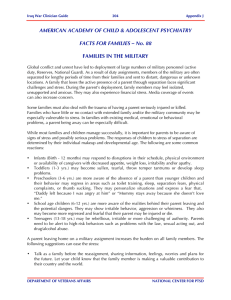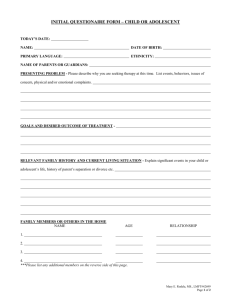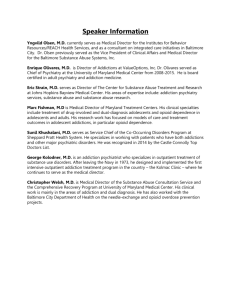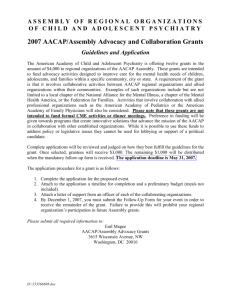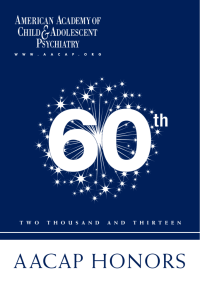award requirements - American Academy of Child and Adolescent
advertisement
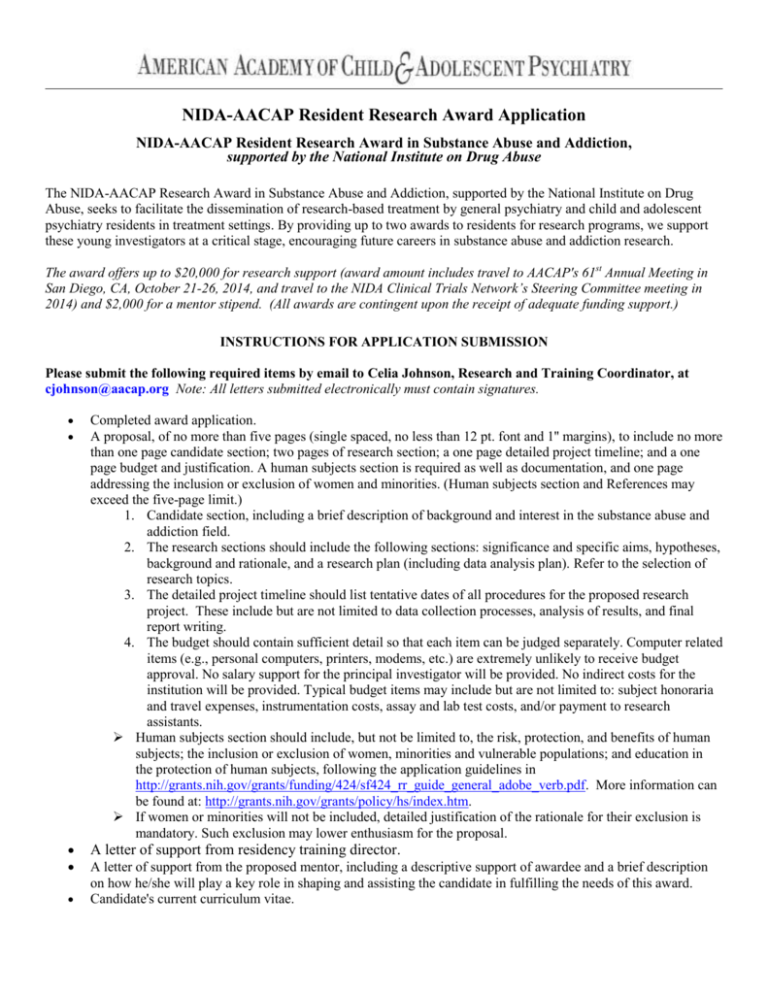
NIDA-AACAP Resident Research Award Application NIDA-AACAP Resident Research Award in Substance Abuse and Addiction, supported by the National Institute on Drug Abuse The NIDA-AACAP Research Award in Substance Abuse and Addiction, supported by the National Institute on Drug Abuse, seeks to facilitate the dissemination of research-based treatment by general psychiatry and child and adolescent psychiatry residents in treatment settings. By providing up to two awards to residents for research programs, we support these young investigators at a critical stage, encouraging future careers in substance abuse and addiction research. The award offers up to $20,000 for research support (award amount includes travel to AACAP's 61st Annual Meeting in San Diego, CA, October 21-26, 2014, and travel to the NIDA Clinical Trials Network’s Steering Committee meeting in 2014) and $2,000 for a mentor stipend. (All awards are contingent upon the receipt of adequate funding support.) INSTRUCTIONS FOR APPLICATION SUBMISSION Please submit the following required items by email to Celia Johnson, Research and Training Coordinator, at cjohnson@aacap.org Note: All letters submitted electronically must contain signatures. Completed award application. A proposal, of no more than five pages (single spaced, no less than 12 pt. font and 1'' margins), to include no more than one page candidate section; two pages of research section; a one page detailed project timeline; and a one page budget and justification. A human subjects section is required as well as documentation, and one page addressing the inclusion or exclusion of women and minorities. (Human subjects section and References may exceed the five-page limit.) 1. Candidate section, including a brief description of background and interest in the substance abuse and addiction field. 2. The research sections should include the following sections: significance and specific aims, hypotheses, background and rationale, and a research plan (including data analysis plan). Refer to the selection of research topics. 3. The detailed project timeline should list tentative dates of all procedures for the proposed research project. These include but are not limited to data collection processes, analysis of results, and final report writing. 4. The budget should contain sufficient detail so that each item can be judged separately. Computer related items (e.g., personal computers, printers, modems, etc.) are extremely unlikely to receive budget approval. No salary support for the principal investigator will be provided. No indirect costs for the institution will be provided. Typical budget items may include but are not limited to: subject honoraria and travel expenses, instrumentation costs, assay and lab test costs, and/or payment to research assistants. Human subjects section should include, but not be limited to, the risk, protection, and benefits of human subjects; the inclusion or exclusion of women, minorities and vulnerable populations; and education in the protection of human subjects, following the application guidelines in http://grants.nih.gov/grants/funding/424/sf424_rr_guide_general_adobe_verb.pdf. More information can be found at: http://grants.nih.gov/grants/policy/hs/index.htm. If women or minorities will not be included, detailed justification of the rationale for their exclusion is mandatory. Such exclusion may lower enthusiasm for the proposal. A letter of support from residency training director. A letter of support from the proposed mentor, including a descriptive support of awardee and a brief description on how he/she will play a key role in shaping and assisting the candidate in fulfilling the needs of this award. Candidate's current curriculum vitae. Letter detailing any current non-Federal research funding (role on project, title, type of project, and source of funds). Note: All research protocols involving human and animal subjects must be approved and undergo continuing review by an Institutional Review Board (IRB). This must be verified at time of award and does not need to be included with the application. PROPOSED CLINICAL RESEARCH TOPIC AREAS Proposals must include components of child and adolescent substance abuse and/or addiction treatment research. Recommended topic areas include: Screening and brief intervention for adolescents misusing tobacco, alcohol and other drugs including prescription medications; Smoking cessation for adolescent patients in the medical or behavioral healthcare system; Integrating substance abuse treatment for youth with(in) primary care or a medical home; Integration or augmentation of electronic health records to include substance abuse and addiction disorders for youth; Prescription drug abuse in youth; Co-occurring disorders in youth; Screening and management of HIV/Hepatitis/STD infections in adolescent patients with substance abuse and addiction disorders; or Other research projects that meet the criteria of direct relevance to child and adolescent substance abuse and/or addiction treatment research and dissemination will be considered. If this situation applies, applicants will contact Yoshie Davison, M.S.W., AACAP Director of Research, Training and Education at ydavison@aacap.org to discuss before submitting. AWARD REQUIREMENTS Applicants must be enrolled in a psychiatry, child psychiatry, or triple board program and be at the PGY2 level or higher. Applicants must be in a fully accredited general psychiatry or child and adolescent psychiatry clinical research or training program. Applicants must have a mentor who has had experience in the type of research that is being proposed and it is preferred that their work include children and adolescents participants. The mentor does not need to be a child psychiatrist by training. Candidates must not have any current or previous significant, individual research funding in the field of child and adolescent mental health. Candidates should not have had previous or simultaneous funding from the National Institutes of Health (NIH) or other research funding sources. Eligible candidates will not have a career development award. Applicants must either be AACAP members or have a membership application pending (not paid by the award) and agree to submit a poster presentation on his or her research for the AACAP's 61st Annual Meeting in San Diego, CA, October 21-26, 2014. Applicants must agree to attend the NIDA Clinical Trials Network’s Steering Committee meeting in 2014 to experience data sharing, review grant application processes, and network with other addiction clinicians and researchers. Applications must be submitted via email by 11PM EST on September 20, 2013. All applicants are responsible for ensuring their own adherence to all federal research regulations, certifications and assurances. Institutional agreement of acceptance of their role and responsibility for the oversight of the applicant’s research will be requested through the application process. Participants agree to participate in all annual surveys as part of the program evaluation process. REPORTING REQUIREMENTS All human and animal subjects approvals and certifications must be submitted. All award recipients will be required to submit a presentation on his/her research findings for the AACAP Annual Meeting. PERSONAL INFORMATION First Name: Middle Initial: Last Name: Degree(s): Are you a Member of the AACAP: Yes. No. If no, do you have an application pending? Yes No Please list your resident year: Type of residency program: Name of your institution: Your title (if applicable): Address: City: State: Zip: Work Phone: , ext. Email: Home/Cell Phone: , ext. Fax: Do you consider yourself to be: Hispanic or Latino or Not Hispanic or Latino What race do you consider yourself to be? Select one or more of the following: American Indian or Alaska Native Native Hawaiian or Other Pacific Islander Asian White Black or African American PRIMARY MENTOR INFORMATION First Name: Degree: Last Name: Institution: Address: City: Phone: State: , ext. Email: Zip: PROJECT INFORMATION Project Title: Please indicate your agreement to attend the AACAP's 61st Annual Meeting in San Diego, CA, October 21-26, 2014 and the NIDA Clinical Trials Network’s Steering Committee meeting in 2014 by initialing here: (This is a program requirement). Please indicate how you learned about this program: Review Process Applications will be reviewed by senior investigators with experience in related work in child and adolescent psychiatry research. Prior to the scientific review process, applications will undergo an administrative review process. Administrative Review – Applications will be reviewed for submission of all application materials. Incomplete applications will not be forwarded for scientific review. Please ensure you meet the eligibility requirements and have submitted all requested application materials before finalizing your application. Scientific Review – Applications will undergo a scientific review process by senior child and adolescent psychiatry researchers. Applications will be scored by the NIDA-AACAP Resident Research Award Program Selection Committee. The Selection Committee will prepare written reviews of the application and score the application. The review criteria are as follows: o Scientific excellence of the proposed research plan, including conceptual or clinical framework, design, methods and analyses; o Feasibility of the proposed research to advanced scientific knowledge or clinical practice in the field of child and adolescent psychiatry; o The applicant’s commitment and potential to become a career investigator; o Endorsement, support and qualifications of the applicant; and o Strength of commitment and support from the applicant’s host institution. The AACAP reserves the right to cancel the award if terms and conditions are not met. AACAP maintains the right to waive informalities. By submitting this document to AACAP, I indicate that I have read and agreed to the NIDA-AACAP Resident Research Award in Substance Abuse and Addiction Requirements. DUE DATE: 11PM EST SEPTEMBER 20, 2013 All completed applications and attachments must be submitted by 11PM EST on September 20, 2013. Materials should be sent to Celia Johnson at cjohnson@aacap.org.
